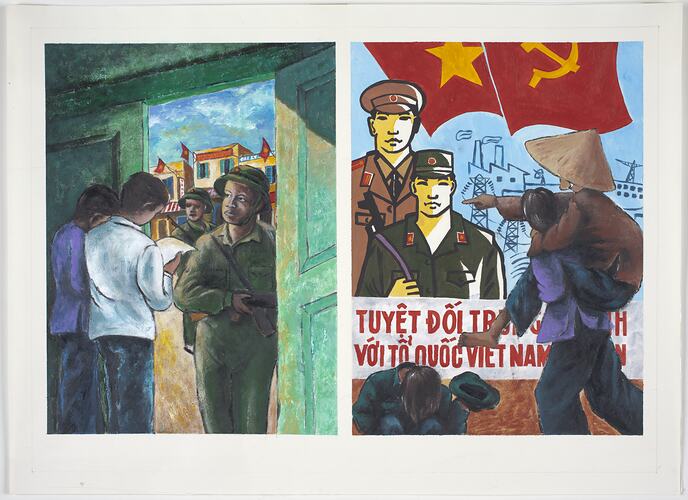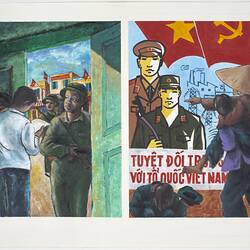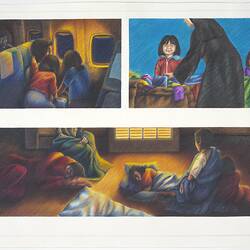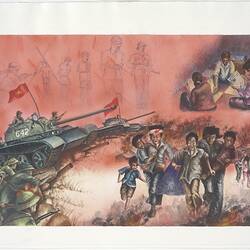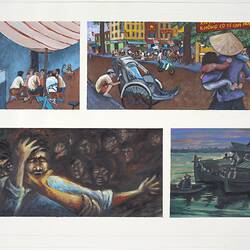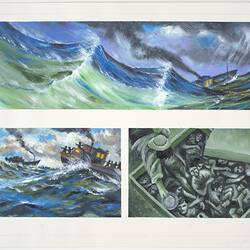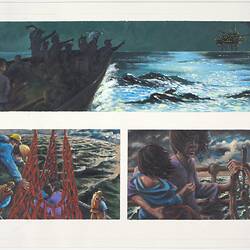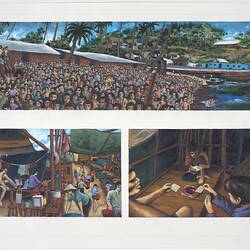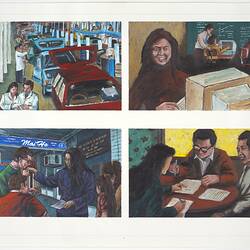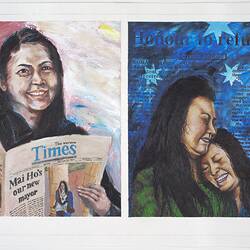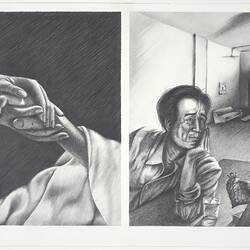Mai Ho was born and grew-up in Saigon's District 5 during the Vietnam War. Her childhood was characterised by political unrest, threats to her safety and the shadow of war. Mai recalls having her classes interrupted with announcements to 'go home, there's a bomb' (Mai Ho interview, 1997), and visiting and writing letters to the soldiers while at school. She had a fairly comfortable life, living with her mother, father and older brother and sister in a two bedroom house. Mai's father was the editor of a controversial bilingual political magazine for American and Vietnamese soldiers, and the children grew up talking about social and political issues.
Mai's father became very ill after the fall of Saigon in 1975, and the family were forced to move to the new economic zone. Living conditions were poor, there was often no electricity, soldiers would requisition common household items and forced conscription of male family members was a common punishment for people who did not obey government orders.
At the age of sixteen Mai married her friend's brother who was a wealthy pharmacist, and eighteen years her senior. She married young like many other Vietnamese girls to avoid marriage to a Northern Viet Cong soldier. She went to live with her husband's family and soon had two girls, Tan and Min, who were born a year apart. Her husband's grandmother was very strict and Mai disliked her. However she later came to admire and respect this woman who taught her many important lessons, including 'how to run a family, how to behave in public, how to treat the elders, how to treat your relatives, how to treat the people around you...But at the same time you have to save a lot of money, so in time that (your) family in crisis, then you be able to still driving, keeping the force of the family' (Mai Ho interview, 1997).
Mai's family had escaped from North Vietnam in 1954, and had tried to leave Vietnam in 1975, before Mai's marriage. After her marriage Mai began the slow process of convincing her husband and his grandparents to escape. In 1978, as life became increasingly difficult under Communist rule, they agreed to leave and purchased a boat for 200 gold ounces (a considerable amount of money). Unfortunately the boat was confiscated (nationalised) by the government and Mai was left to organise the escape herself. Her husband would not negotiate for the release of the boat as it meant dealing with people who he considered were beneath him.
Mai befriended a woman who had been imprisoned and permanently disabled by the South Vietnamese government in 1960, and released when the Communist government came to power in 1975. The woman spoke to the Prime Minister, who released the boat. Mai then bribed various officials to obtain permits so the boat could move freely from place to place. Through word of mouth Mai organised for 161 people to escape on the boat including her two daughter's Tan and Min, her mother, brother and sister. Mai's husband and his grandparents decided to remain in Vietnam, although her husband had planned to follow them once Mai sent word of where they were.
They were crammed into the hold of the boat until they reached international waters and spent five nights at sea, before an English oil rig agreed to rescue them after several hours of negotiation. The oil rig transported them to the Malaysian refugee camp Pulau Bidong. When they arrived at the camp they were asked to register any valuables, which were then confiscated. The living conditions in the camp were poor and their daily rations were limited. Mai began working as a translator for the Australian delegation, as she knew some English. During this time she realised that her husband did not intend to join them.
After a month they were transferred to another camp, where Mai continued to work as a translator and in the library. Tan and Min, then four and three, attended kindergarten classes where they learnt songs and some English. Mai's family had to decide where to resettle, Mai's sister suggested America as they already had friends there, while Mai thought they should settle in Australia. They voted and decided on Australia. Then after two and half months in the camp the announcement came that they would be arriving in Australia on the 15th December 1981.
They arrived at Tullamarine airport and were taken by bus to Midway hostel in Maribyrnong. They began English lessons and Mai worked picking fruit to support her family. She then heard about work at the GMH Holden factory. She was initially rejected, but persuaded the personnel officer to give her an opportunity. Two and half months after arriving in Australia, Mai became the first female quality control inspector at the Fisherman's Bend Plant.
The family left Midway, first renting a house in Moonee Ponds before moving to Footscray. As well as working full time and raising her children Mai studied part-time to obtain qualifications in human resource management, computer operations and beauty therapy. In 1987 she opened her own computer business, and by 1990 she had opened her own beauty salon, leaving the management of the computer business to another partner.
Meanwhile Mai established a Vietnamese community support service in Footscray with two friends, believing that 'if they (Vietnamese migrants) are better informed, they have English and if they know their rights and if they know the... way of life, what Australia thinks, then it would make it much easier for them' (Mai Ho interview, 1997). At the age of twelve Mai's daughter Tan began helping out at the service, going on to become president of the Australian Vietnamese Services Resource Centre at the age of eighteen.
In 1992 Mai decided to stand for the local election as she could see that 'there are many Vietnamese and...we have many needs...When they (local government) make the decisions they never listen to us... Many decision was unfair' (Mai Ho interview, 1997). Despite strong support she was defeated due to hundreds of uncounted informal votes. She stood again the following year, this time for the Labor Party, and was successfully elected. In 1994 she became the Deputy Mayor of the City of Footscray, and in 1995 and 1996 was on the board of the Western Melbourne Institute of TAFE and the VUT. In 1997 Mai again stood for election and became Mayor.
She returned to Vietnam in 1995 with the Australian Consultative Delegation to Vietnam, the first delegation to investigate human rights in Vietnam. She remembers being unable to hold back the tears when she landed and saw the devastation from the war 'about more than one million orphans, more than one million handicapped soldiers and you cannot hold your tears... You just feel so sorry for the country' (Mai Ho interview, 1997).
Mai no longer considers returning to Vietnam to live, although she may visit. 'I never consider live in Vietnam any more. I think that I actually grow up here, not in Vietnam, although when I arrive here I'm already 20 years old... When I go overseas and when I come Australia I feel so calm and when I was in Vietnam and I was long for to come back to Australia' (Mai Ho interview, 1997).
References
Mai Ho and Tan Le. Personal Interview. 14 December 1997
Mai Ho. Personal Interview. 25 January 1998
Mai Ho. Personal Interview. 29 January 1998.
More Information
-
Keywords
immigration, Cultures and histories : Melbourne and Victoria, War
-
Authors
-
Article types
